News & Events
The Top Ten Reasons Why CGS May Be Right for You
Boston University’s College of General Studies is a two-year core-curriculum general education program that is part of a four-year degree at Boston University. It’s a nationally renowned program that has provided leadership in general education for more than 70 years.
At CGS, you get to experience the best of both worlds: a balance between a small, private liberal arts college, and a large, urban research university. You'll also get the opportunity to pursue your passions during your gap semester, explore London in a study abroad program the summer after your first year, and participate in groundbreaking real-world research.
Here are the top 10 reasons why CGS may be right for you, according to CGS Dean Natalie McKnight.

Clear pathways to the other 10 undergraduate colleges at BU
While CGS follows its own curriculum with its own set of required courses each semester, students have room in their schedules to work towards their major and pursue electives at the same time. This sets them up for a seamless continuation into the college of their choice, as well as a strong foundation in CGS's foundational liberal arts curriculum. You'll work with your CGS Academic Advisor to develop a pathway to the degree of your choice.
Opportunity to study abroad in your first year of college
 As a CGS student, you'll have the unique opportunity to study abroad in your first year. After spending the spring semester in Boston, the vast majority of CGS students seize the opportunity to spend their summer abroad in London, exploring the city's history and culture while continuing their CGS curriculum. Students who prefer not to go to London can complete their summer study in Boston. Both summer options are full of enriching activities and field trips with faculty that are embedded into the curriculum, including historic sites, museums, and general notable landmarks in the area. Once students finish their six-week summer semester, they will start right back up in Boston in the fall, beginning their sophomore year in sync with all other BU students.
As a CGS student, you'll have the unique opportunity to study abroad in your first year. After spending the spring semester in Boston, the vast majority of CGS students seize the opportunity to spend their summer abroad in London, exploring the city's history and culture while continuing their CGS curriculum. Students who prefer not to go to London can complete their summer study in Boston. Both summer options are full of enriching activities and field trips with faculty that are embedded into the curriculum, including historic sites, museums, and general notable landmarks in the area. Once students finish their six-week summer semester, they will start right back up in Boston in the fall, beginning their sophomore year in sync with all other BU students.
Outstanding undergraduate research and internship opportunities
CGS offers students the opportunity to work on paid undergraduate research and professional internships, one-on-one with faculty members in every discipline. This is a great resume-building opportunity for students early in their college career, as well as a way for students to get to know faculty members and explore different fields of study in which they may be interested.

Excellent, professional, full-time advisors to guide students
CGS is equipped with a full team of professional advisors with master's degrees in areas like counseling, social work, higher education administration, and related concentrations. While other institutions may have faculty serving as advisors as well as teaching, our unique approach to academic advising ensures that students receive our advisors’ undivided attention and guidance. Your academic advisor will help you navigate the processes of picking the right courses in the right order, discerning a major, thinking about career paths, and adequately drawing from the countless resources that Boston University has to offer.

Outstanding, full-time Ph.D. faculty teaching all CGS courses
Our faculty works full-time—no TAs, part-time assistants, or graders. Each professor offers lectures, teaches discussion sections, holds office hours, and grades all assignments and exams. This makes for a seamless learning experience—if a student is having trouble with course material, there is one place to go. In addition, we are fully equipped with a faculty that loves to teach. They are active researchers, with published works on subjects ranging from Victorian literature, to quantum physics, to Boston’s very own Red Sox baseball team.

We don’t just say we’re doing a good job—we assess what we do
We are national leaders in assessing higher education effectiveness, having presented at multiple international and national conferences and published on the subject. To measure our effectiveness, we have composed a rubric listing outcomes areas that we hope students develop in their two years with us. Our e-Portfolio tool helps us track and analyze student progress over their four semesters at CGS, with students uploading their work for every course during each semester. This allows our trained faculty to assess students’ work, and determine their level of mastery for each of those learning outcome areas, for each course, each semester that they are with us.
After about 10 years of working with this analytical process, we have found that our students are making three to four times the amount of progress in their first two years of college compared to multiple other national studies assessing tens of thousands of students.
Team system helps students form friendships and study groups
 CGS breaks its student body down into teams of 75-80 students per team, who share the same faculty over the first two semesters—in Boston, and London. The socially-cohesive team system is effective in fostering close relationships between students. Students get to know each other and their professors well, and having cohorts of students under the same faculty encourages them to form study groups and work together to prepare for exams and presentations.
CGS breaks its student body down into teams of 75-80 students per team, who share the same faculty over the first two semesters—in Boston, and London. The socially-cohesive team system is effective in fostering close relationships between students. Students get to know each other and their professors well, and having cohorts of students under the same faculty encourages them to form study groups and work together to prepare for exams and presentations.
This system enhances learning, ensuring that students learn the material in a holistic, interdisciplinary way. Professors on each team often work in tandem with one another, allowing students to make connections across the different courses in the curriculum. It prioritizes closer connections among students and their faculty, which in turn helps them obtain better letters of recommendation. The team system also makes it possible to hold an interdisciplinary Capstone project, which marks the culmination of the College of General Studies program.
Gap semester presents a world of opportunities
We’ve noticed that students tend to finish their senior year of high school exhausted, burnt out, and in need of a break. Our fall gap semester allows students to take that much-needed break and use it to do whatever they like—work a full-time job, get an internship, travel, explore new hobbies, volunteer, or pursue their passions. Students come back in the spring refreshed, ready, and excited to learn. There are no limits to where the gap semester may take you as a CGS student!

Network of more than 35,000 alumni in all industries and sectors
Our network of more than 35,000 alumni across all industries and sectors reflects a fierce loyalty to CGS, with a desire to reach out and help students. This is a great networking opportunity and presents countless opportunities for students as they pursue internships and other career opportunities.
Stimulating, interdisciplinary curriculum that encourages connection among courses
CGS offers a stimulating, interdisciplinary curriculum that encourages faculty and students to make connections among their courses. It addresses the question: “What should an educated adult know and be able to do?” Our curriculum hones the skills that employers are most looking for, culminating in a group-written, interdisciplinary, problem-solving Capstone project. And, last but not least, CGS fulfills most of BU’s HUB general education requirements—each CGS course is approved for three HUB areas each, meaning that all students have essentially completed all of their HUB requirements upon completion of CGS, only needing to fulfill a few others within their major in their last two years of college.
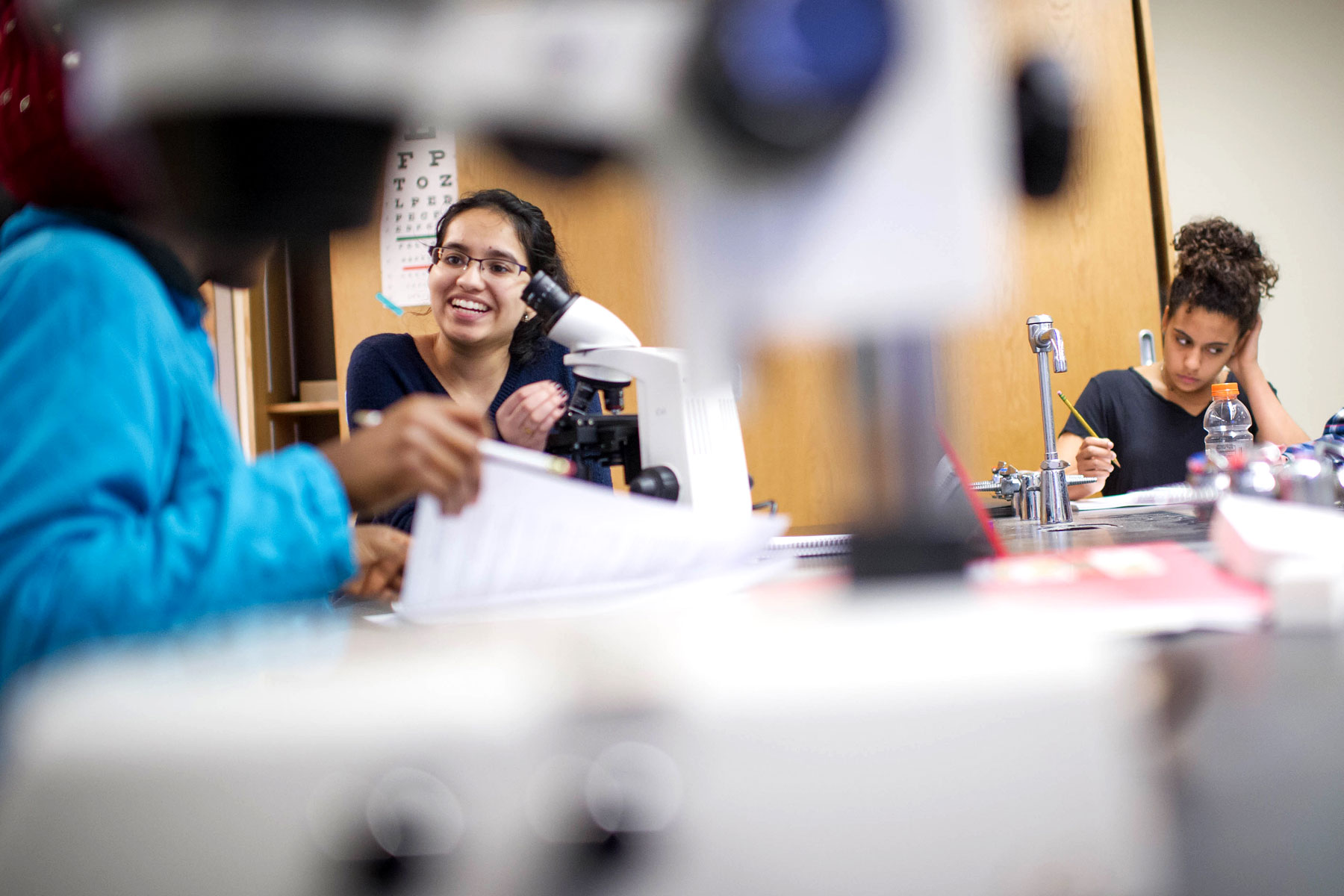
At CGS, we believe that education isn’t just about checking off requirements and making a living, but it’s about making a life. Congratulations on your admission to Boston University, and we hope to see you at the College of General Studies next year!
Compiled by Adriana Rivera
Students Recognized for Outstanding e-Portfolios
By Adriana Rivera
In an interdisciplinary curriculum like that offered by the College of General Studies, making connections across courses is of paramount importance. Through the use of Digication’s e-Portfolio tool, students can do just that, compiling assignments from all of their courses into one concise package that showcases the depth and breadth of their learning.
"In a program like CGS that prioritizes integrated learning, students benefit from having a single e-Portfolio for exploring meaningful connections across their courses," said John Regan, a CGS Master Lecturer of Rhetoric and Coordinator of e-Portfolio and Assessment for the College.
Each semester, two students are recognized and awarded for their outstanding e-Portfolio pages. A strong e-Portfolio, according to Regan, “employs design elements that reflect the individual student’s unique identity and interests," and also "contains a wide range of student work in terms of both content and medium—what our students create in response to assignments with visual, audio, and video components is truly impressive and e-Portfolio captures those well.”
We spoke with this year's e-Portfolio award winners, CGS sophomores Kate Charlotin and Tiffany Ngyuen, about how they approached the project and what they've learned from looking back on their own work.
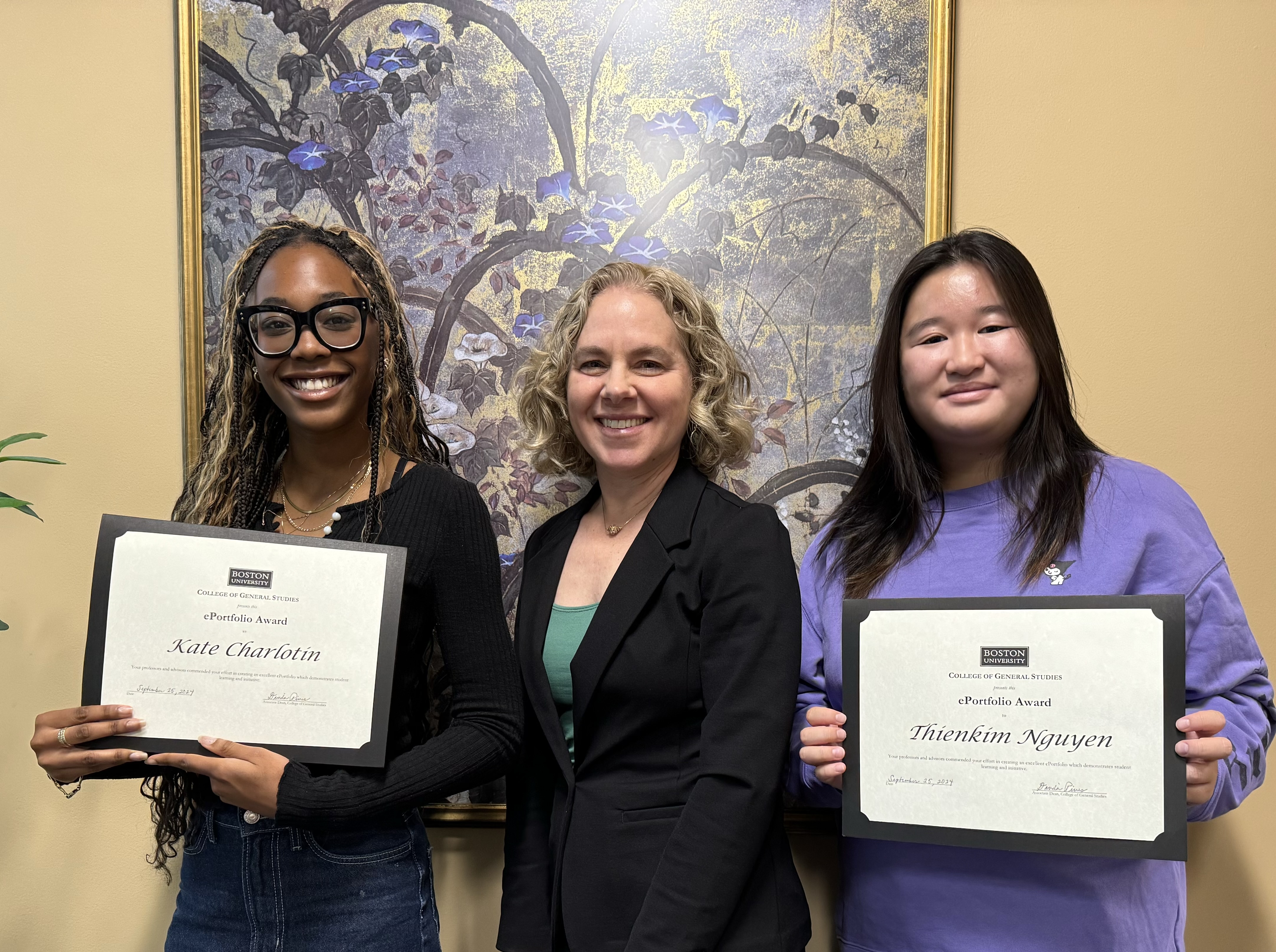
Kate Charlotin (CGS '25)
Why do you think your e-Portfolio stood out, and what made it unique?
I think my e-Portfolio stood out because I made it more comprehensive and visually appealing than just a basic collection of assignments. I organized the content into separate tabs for each of my classes, not just my CGS courses, which gave it a broader scope. The use of vibrant colors, like blue and yellow, added personality, but I also kept the overall design professional to strike a balance between creativity and formality. This thoughtful combination of organization and design made my portfolio unique and engaging.
What did you learn from creating your e-Portfolio?
From creating my e-Portfolio, I learned to take pride in my work and consider the broader audience beyond just my professors. Knowing that anyone, including potential employers, could view my assignments made me think more critically about how I presented my work. It encouraged me to put extra effort into each piece and to treat the portfolio as a reflection of my academic journey and personal growth.
What was your favorite part of the process?
My favorite part of the process was personalizing and designing my actual page. It was fun to create a space that felt like mine, where I could showcase my personality while still maintaining a professional tone. Choosing the layout, organizing the content, and picking the color scheme allowed me to be creative, which made the project more enjoyable.
What’s a common misconception about e-Portfolios?
A common misconception about e-Portfolios is that they’re just something professors assign that don't hold much value. However, I found that it was much more than just a school project. I added my e-Portfolio to my LinkedIn profile and shared it with potential employers, which helped me land an internship. It’s not just busy work, it's a valuable tool for showcasing your skills and experiences in a professional setting.
What advice do you have for students who are trying to create a strong e-Portfolio?
My advice is to start personalizing it right away. Once you add your own style and make it visually appealing, it becomes easier to maintain and update. Archiving your work in this way can actually be a fun and prideful experience, as it lets you reflect on everything you've accomplished. Plus, it’s a great way to remember your time at BU and share your growth with others, so take it seriously and enjoy the process!
Tiffany Ngyuen (CGS '25)
Why do you think your e-Portfolio stood out, and what made it unique?
I think my e-Portfolio stood out for its organization, uniformity, and overall personality. I incorporated a light academia theme to all the pages, which I feel like fits my personal aesthetic very well. In my reflections, I talked a lot about my own experiences and used my inner dialogue to guide my e-Portfolio writing, which I think engaged viewers because they may have felt connected to the dialogue.
What did you learn from creating your e-Portfolio?
Through writing for my e-Portfolio, I learned a lot about the importance of reflecting on my writing as a source of growth. In the past, whenever I wrote an essay and submitted it, I never really looked at it again. But the e-Portfolio "forced" me, in a way, to not only look at the feedback on my writing but also connect it to what I was learning and my personal experiences, which motivated me to re-read my writing and improve it.
What was your favorite part of the process?
My favorite part about the process was just figuring out the mechanics of e-Portfolio and my design scheme, overall making the portfolio my own. A lot of people complain about it being complicated at first, which I totally agree with, but once I figured it out, it was really simple to implement my character on each page and incorporate it into the academic work I featured. For example, I wrote a lot of papers about love (the meaning of love, love as a prevalent theme throughout my study abroad experience in London) and tying it to the light, airy, but also sophisticated theme of light academia was really enjoyable for me.
What’s a common misconception about e-Portfolios?
A common misconception about e-Portfolio that even I held was that it is exclusively for CGS and that it's just for your professors to have a central hub for your work. While that is true, the functions of the e-Portfolio can be so versatile, as I know that some link it on their LinkedIn for potential employers to view all of their academic work. Most job applications will require some form of exemplar work, and the e-Portfolio is a great place to source it from.
What advice do you have for students who are trying to create a strong e-Portfolio?
Take your time creating your e-Portfolio! The e-Portfolio is constantly evolving and changing. So take your time thinking about how you want to portray yourself on your portfolio, because when you make a portfolio you really love, you’re going to want to go back into it constantly and feel more prideful in your work!
2024 Capstone Award Winners
On October 18, the Boston University College of General Studies celebrated the outstanding students who received awards for the Capstone projects they completed last May. The Capstone project is a 50-page research paper that CGS students complete during their sophomore year. Students draw on two years of interdisciplinary studies, working as a team to synthesize data into a meaningful whole—making a proposal or reaching a verdict and justifying their conclusions through their research. The Capstone award is given annually to the group of students who present the best overall Capstone paper and defense on each team. It is the highest honor bestowed upon a College of General Studies student for an academic project. Below, we highlight why each winning group was chosen, in the words of their faculty.
Team S: Boston University Advocates for the Issue of Homelessness: Analyses and Policy Proposal
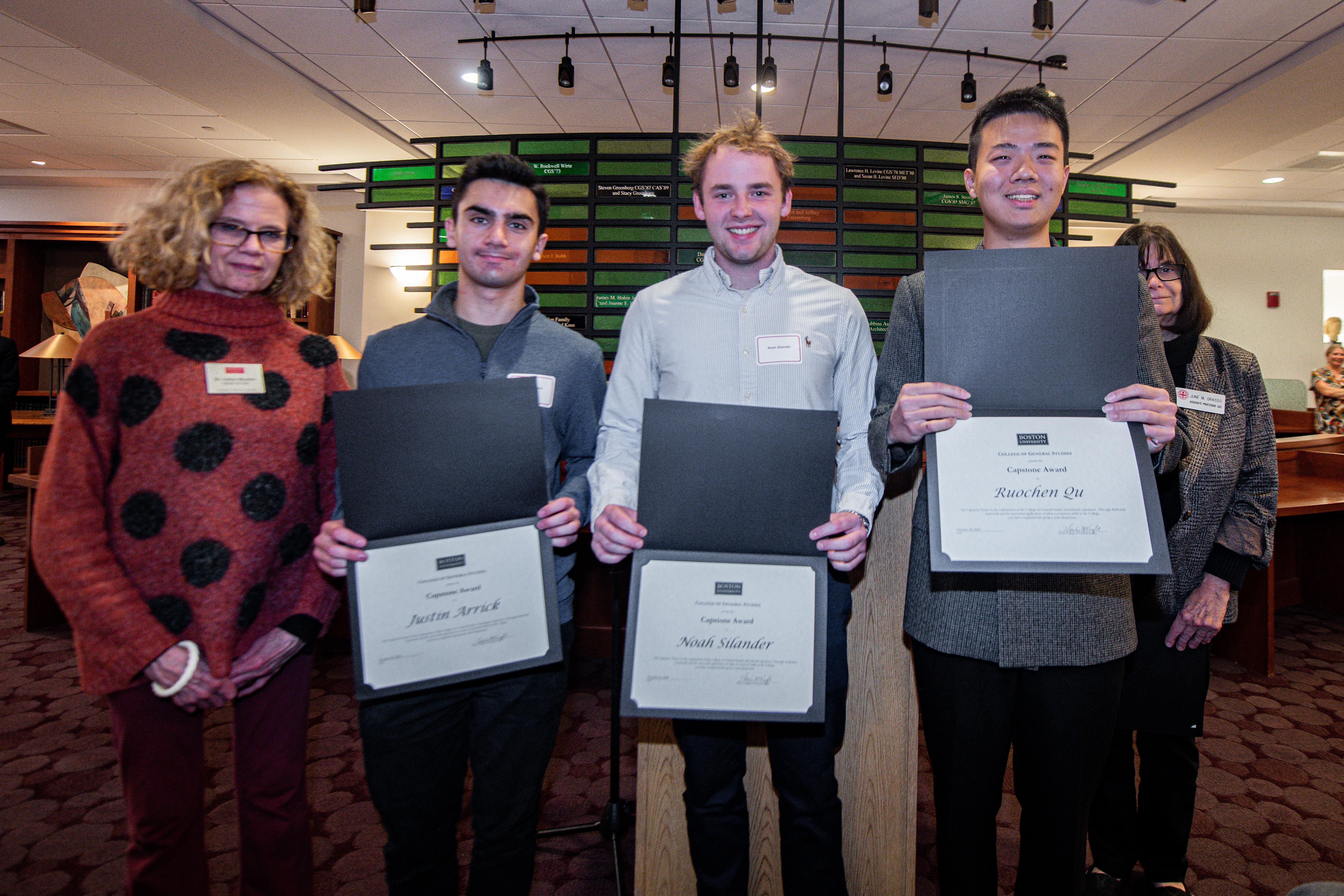
The winning Capstone group for Team S (Justin Arrick, Ruochen Qu, Noah Silander, Zhihe Tian, Natalie Torres-Robinson, Xinyan Yao, Jiyoon Yun, Minjie Zuo) focused on tackling the issue of homelessness. The members constituted themselves as a non-profit organization focused on Massachusetts, especially the Boston area. Their proposal, addressed to the state legislature, covered the controversial issues facing the Healey administration today. The group offered creative new solutions—plus some that have already had some success—expanded sources for funding, and tackled controversial issues such as the push for increased housing density for areas surrounding Boston. The faculty were particularly impressed with the thoroughness and breadth of research. The group used an interdisciplinary approach, focusing on the history, economics, politics, and ethics of the homelessness problem. Their empathy was evident in every policy position; their intellectual sophistication reflected in the document’s finely detailed and fluid prose; their graceful teamwork reflected in the respect with which they regarded each other, making the oral defense satisfying, rewarding, and intellectually stimulating.
Team T: S.A.F.E Public Defense: A Comprehensive Analysis of Mississippi’s Public Defender Crisis
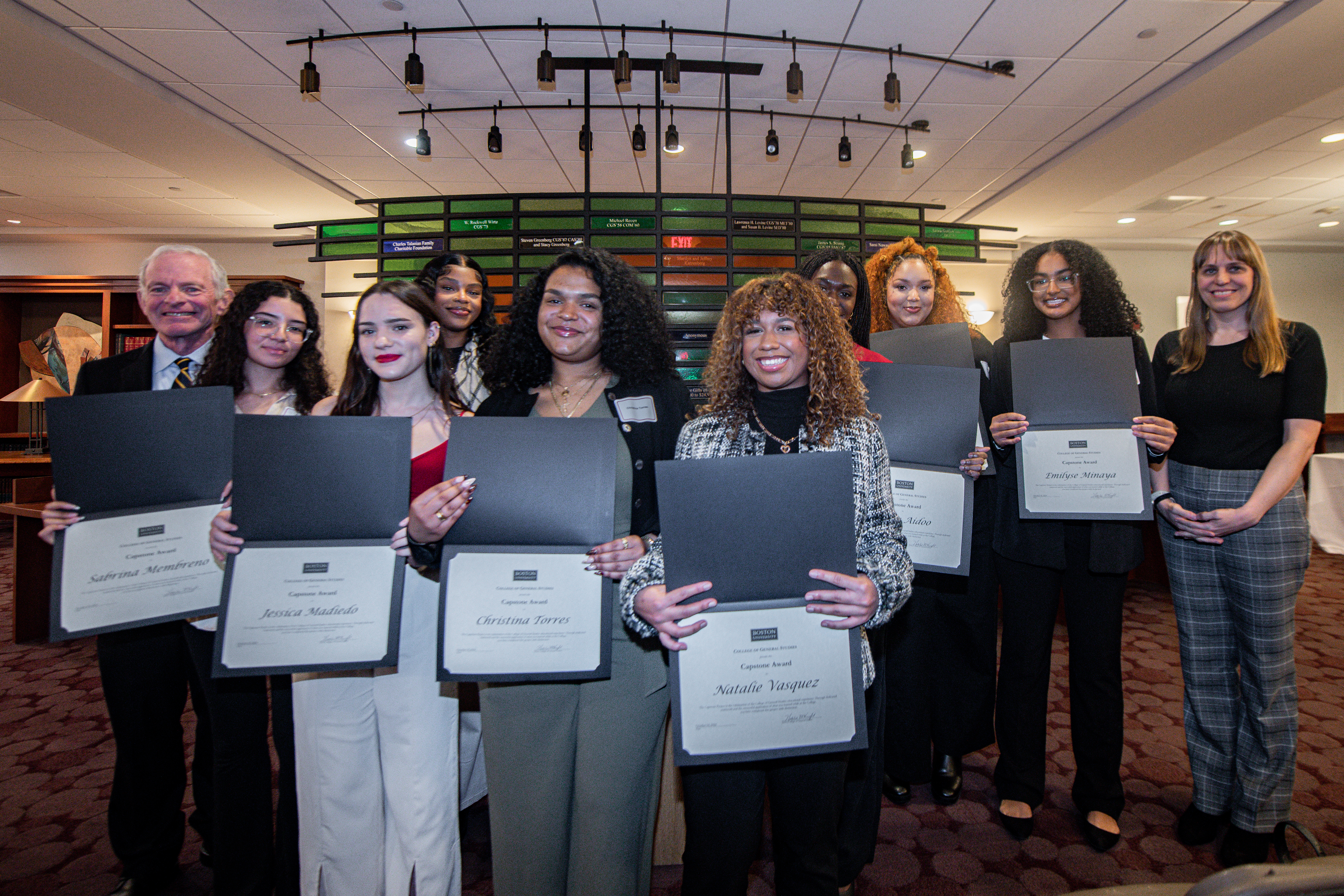
Team T’s winning Capstone group (Araba Aidoo, Janelle Cerene, Emilie Jimenez, Jessica Madiedo, Sabrina Membreno, Emilyse Minaya, Christina Torres, Natalie Vasquez) took an idea from a prompt about mass incarceration, and developed a thesis on the need to provide effective public defense for indigents in the criminal justice system. Using Mississippi’s justice system as a case study for their research, this Capstone group pinpointed where the real deficits lay: in excessive caseloads, in a lack of funding, and in resources so limited that public defenders cannot adequately represent their clients’ interests. The group concluded that indigent defendants’ constitutional rights are continually violated through neglect and institutionalized mismanagement within the criminal justice system. Their solution largely called upon the Sixth Amendment, which states that every individual deserves fair and adequate representation, regardless of socioeconomic status and background. The group proposed the creation of accountable oversight committees, implementing a pilot program which could provide measurable results, loan forgiveness, and unionization for public defenders, among other pragmatic suggestions. They also developed a plan for a more in-depth and holistic client defense and support system, so the glaring lack of justice rooted in the foundation of the U.S. justice system begins to find redress.
Team U: A Recommendation to Expand Harm Reduction in the Opioid Crisis
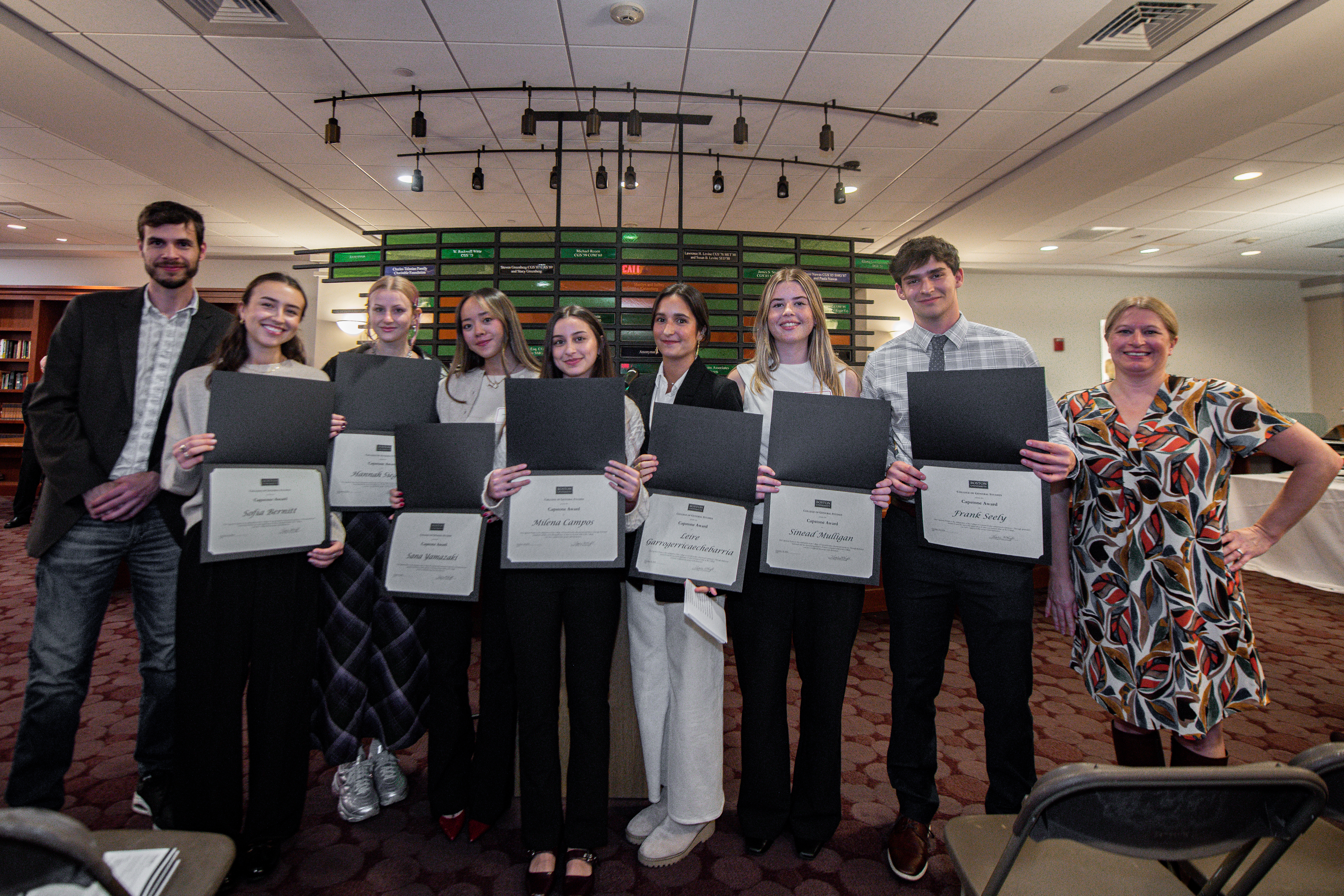
The winning Capstone group for Team U (Sofia Bernitt, Milena Campos, Leire, Garrogerricaechebarria, Sinead Mulligan, Frank Seely, Hannah Siegrist, Sana Yamazaki) focused on how to effectively handle the opioid crisis—an urgent and harrowing issue facing many municipalities. The group identified themselves as a non-profit organization called the Compassion Care Collective, whose motto is “Progress Through Prevention.” They primarily focused on harm-reduction, to prevent further harm to people with substance use disorder in a compassionate, non-judgmental, and non-coercive manner. The group could have focused on any number of cities where opioid use is a problem—at the beginning, they concentrated on Philadelphia, but ultimately decided on Newark, New Jersey. They exhibited an exemplary understanding of Newark’s current political situation, as well as demographics and existing harm reduction programs. The group’s policy recommendation was twofold: first, to gain support from relevant stakeholders by conducting study tours of a successfully operating safe injection facility in New York City. Then, after gaining support, they proposed setting up a safe injection pilot program within an existing harm-reduction facility in Newark. In their proposal, the group recognized the importance of community support, and the importance of working with existing programs. Building off their strong final paper, their defense showcased a group deeply and universally familiar with the material in question.
Team V: Surveillance Policies as a Means for Pandemic Prevention and Monitoring
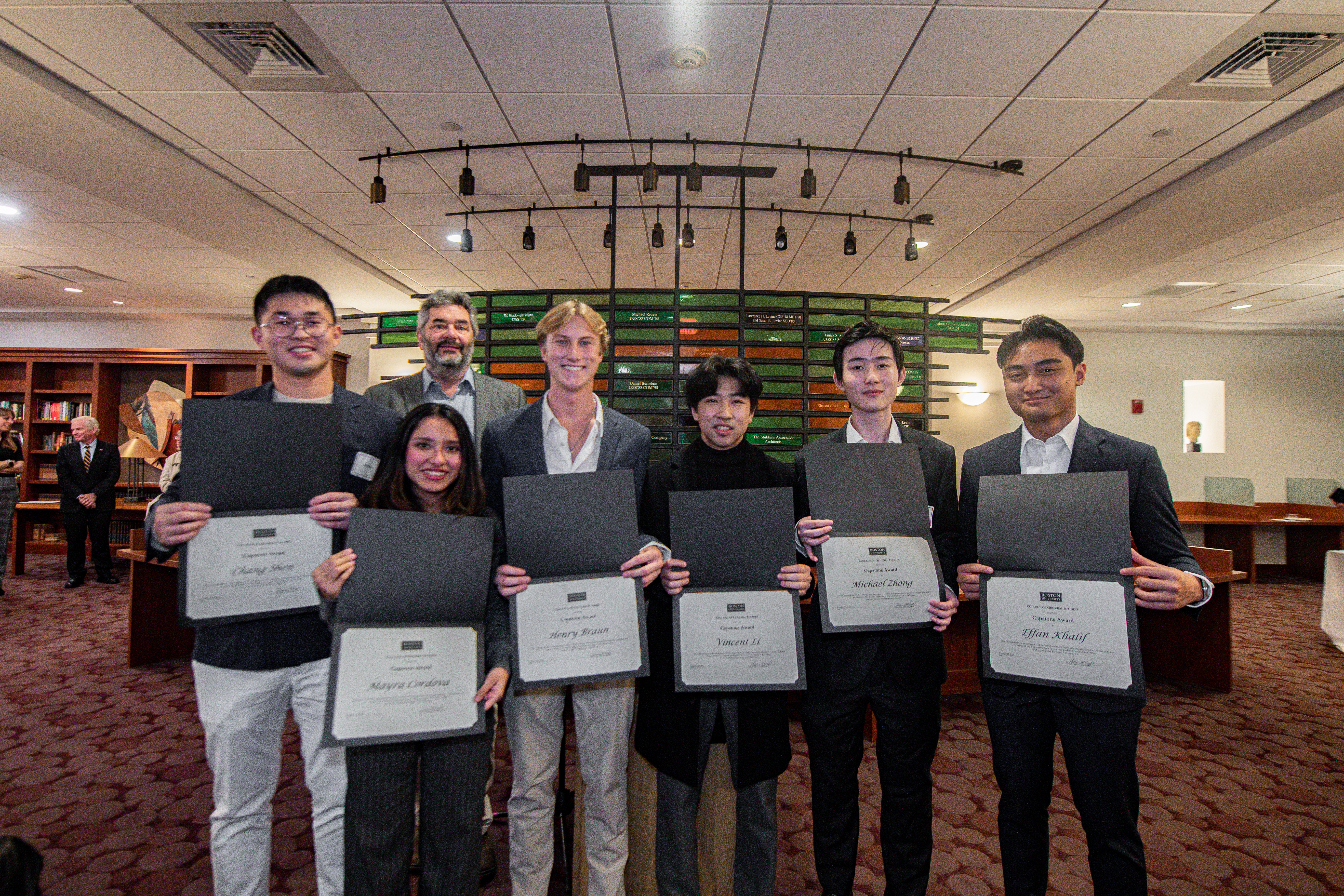
Team V’s Capstone winners (Henry Braun, Mayra Cordova, Effan Khalif, Taek Lee, Vincent Li, Chang Shen, Michael Zhong), operating under the principle that better knowledge leads to better decision making, ideated on steps to prevent another pandemic like COVID-19 in the future. They focused on improving the surveillance capabilities of society through wastewater testing. This way, people and policy makers can have almost instantaneous access to data about the presence of viruses in the community. This Capstone group also argued for the creation of a more comprehensive genomic database for viruses that are circulating in other species. No one has yet learned how to predict future pathways of virus evolution, but the creation of a virus database will help researchers and policy makers prepare for what may come next. In the absence of better wastewater surveillance and a global virus database, policy makers are left with the task of trying to find a solution without notion of the right direction in which to step. This is a difficult position in which to find oneself, but this Capstone group offered a solution, and presented an argument that was both clearly written and logical, with a great deal of supporting evidence.
Team W: High-Fructose Corn Syrup Addiction and Why Government Intervention is Necessary
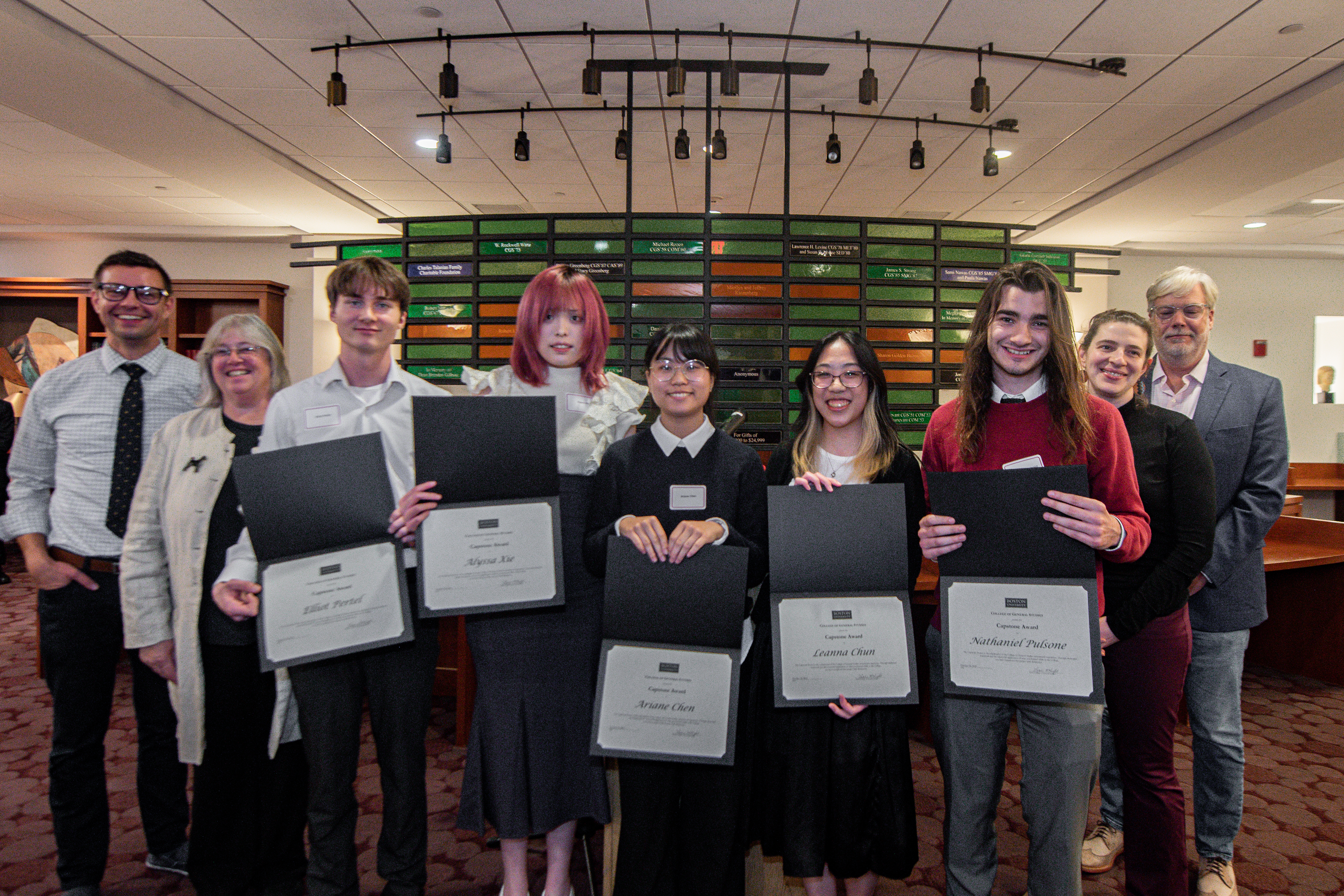
The winning Capstone group for Team W (Harrison Adler, Emem-Obong Akpabio, Ariane Chen, Leanna Chun, Elliot Pertel, Nathaniel Pulsone, Blanca Ramirez, Alyssa Xie) tackled the complex and controversial issue of high-fructose corn syrup (HFCS). They examined the negative health effects of high-fructose corn syrup, both physical and mental, as well as the important context of the problem rooted in agricultural economics. Their thoughtful solution to the problem, in the form of a bill proposal, involved regulation of HFCS content and conspicuous product labeling. In addition to high-quality research and writing, this Capstone project included a series of visual explainers—charts, illustrations, data representations, and the like—that added a great deal to the impact of the project. This group made a convincing case that HFCS addiction is a major public health threat, and they provided a realistic and well-constructed potential solution.
Team Y: A Proposal for The Integrated Tech Company Regulations Act of 2024
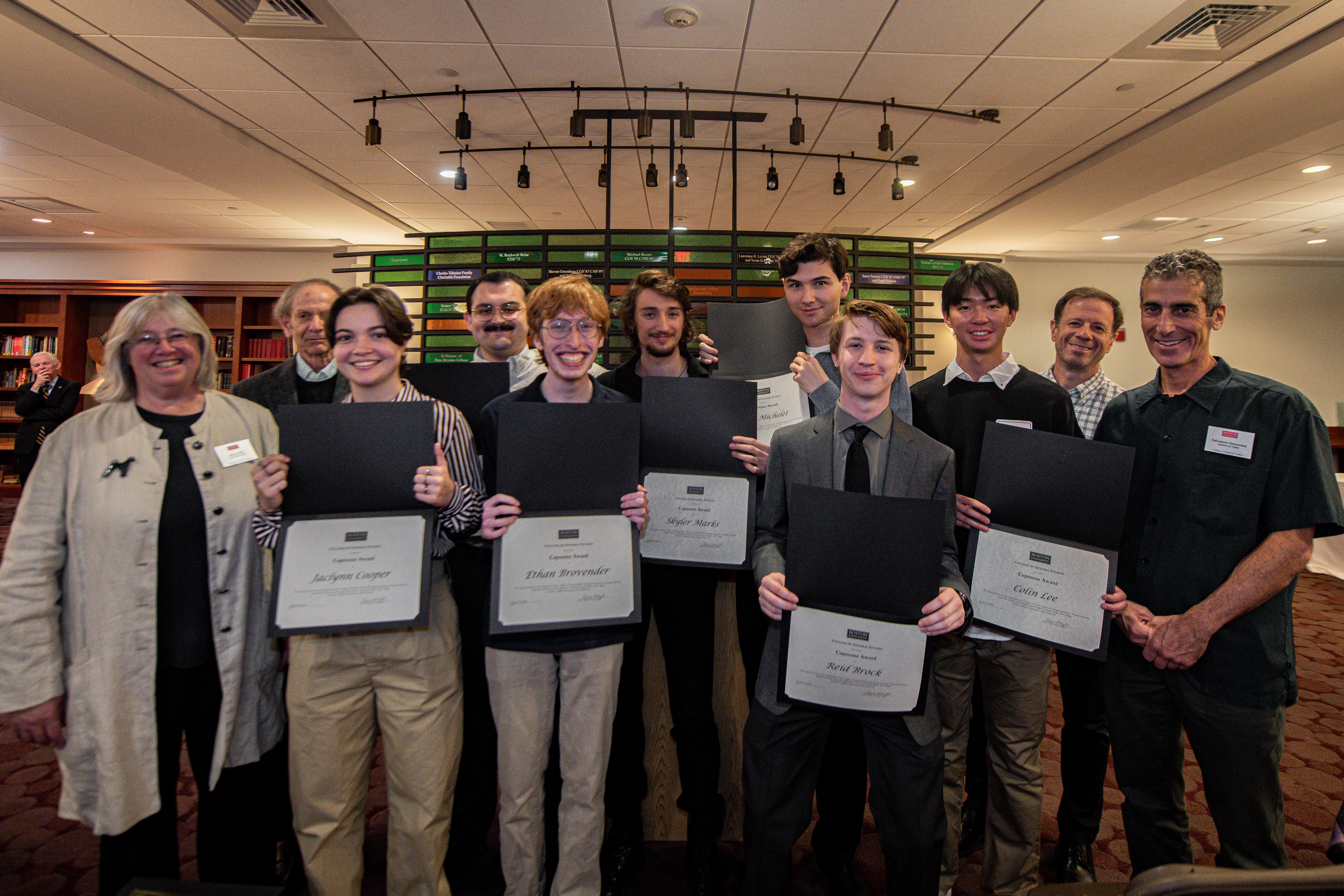
Team Y’s winning Capstone group (Reid Brock, Ethan Brovender, William Conroy, Jaclynn Cooper, John Fox, Colin Lee, Skyler Marks, Eren Michelet) focused on the out-sized power and monopolistic practices of the largest tech companies—a problem that Congress has struggled and consistently failed to address. The group’s research showed that government lawsuits aimed at reining in these behemoths take a long time and yield little achievement. They concluded that the anti-trust laws of the 19th and 20th centuries are simply inadequate to cope with the new digital economy. Taking on the role of legislative staffers steeped in anti-trust history and law, they devised a sophisticated, persuasive, plausible bill that could actually resolve the issue in a way that is both positive and constitutional.
—Compiled by Adriana Rivera, Photos by Ziyu Julian Zhu
Becoming with Dr. Nwando Achebe
By Dean Natalie McKnight
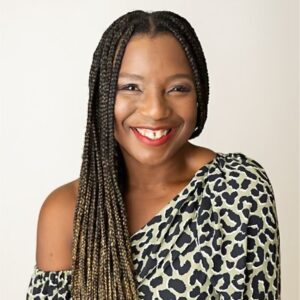
On February 8, 2024, Dr. Nwando Achebe presented a lecture entitled “Becoming: Africanist, Oral, and Gender Historian” in the Jacob Sleeper Auditorium at the College of General Studies as part of the Stanley P. Stone Distinguished Lecture series, endowed in 1990 by alumnus Stanley P. Stone. Dr. Achebe is the Jack and Margaret Sweet Endowed Professor of History at Michigan State University, and author of six books on African history, including Farmers, Traders, Warriors, and Kings: Female Power and Authority in Northern Igboland, 1900-1960, and The Female King of Colonial Nigeria; Ahebi Ugbabe, as well as Holding the World Together: African Women in Changing Perspective, which she co-edited with Clarie Roberson, and Female Monarchs and Merchant Queens in Africa. Dr. Achebe mesmerized the packed auditorium with her presentation which she explained would be like a “dance,” in that she would keep moving seamlessly between the story of her personal journey and her advocacy for a multi-faceted, multi-voiced approach to history, particularly African history.
Achebe compared the practice of history to a dance as well, comparing it specifically to the Igbo masquerade dancing tradition. The only way to truly appreciate the beauty of the dance—any dance, really—is to constantly shift positions. Using dance as a metaphor for the study of history, she argued, is a direct “critique of monological thinking.” Rejecting the notion of any “fixed meaning,” Achebe cautioned that too often African history has been told by non-Africans and only from one perspective. She asked, more than once, “What histories? Whose histories?” are being told in traditional accounts. Illustrating her point with an Igbo (southwestern Nigerian) proverb, she proclaimed, “Until lions have their own historian, the story of the hunt will always glorify the hunter.”

Achebe’s research relies on sources that have not traditionally been foundational to historical studies: oral history, proverbs, fables, and personal history. Woven into her declarations about African history were multiple references to her own personal journey and her relationship with her parents, Christie and Chinua Achebe. She noted that they gave her a name that means “a child is a shade,” meaning a child can shade or protect her parents in their later years, and she made it clear that she has done just that, cradling her father’s head in her lap as he passed away 11 years ago and continuing to care for her mother who is now 88 years old. Later in the presentation she reflected on the impact of the publications of her father, Chinua Achebe, particularly Things Fall Apart, which is the most widely read work of African fiction to date, and one of the first to present colonialism from the perspective of the colonized. That perspective influenced her to disrupt the traditional canon (of literature and historical accounts), and to advocate for the rights of all members of society and give voice to the voiceless.

One false notion of Africa that Dr. Achebe disrupted in her lecture is the misperception that Africans look at love through a “provider” or financial lens, not a romantic one. In the week before Valentine’s Day, it was particularly fitting that she emphasized how that perception is simply not true; she traced the etymology of some of the Igbo and Kenyan words used for love, which come from a belief that love is truly seeing and knowing someone deeply. She also described intricate love beads that courtship partners used to engage their lovers and beaded love letters they shared to express their feelings. But she acknowledged that Nigeria has had an “embattled history with same sex desire,” with strict laws against same sex relationships, and she argued passionately that these laws blatantly defy the Nigerian constitution which protects the rights to private life, private family life, freedom of movement, and freedom of association. She referred to the laws against same sex relationships as a “legislation of harming,” and she illustrated her point with a Nigerian proverb which says that a person who holds another person down in the mud has to stay in the mud themselves to do so. The act of dehumanizing others dehumanizes the dehumanizer.

Dr. Achebe concluded her presentation by stating that as a historian, author and editor she aims to support other African scholars and works to add complexity and nuance to perceptions about Africa. She closed with a fable from Ghana about Anansi the spider, who had a pot with all the knowledge in the world. Anansi did not want to share the knowledge with anyone, so he climbed a tree with the pot hanging around his neck, but the climb was very difficult. His son called up to him and told him to hang the pot on his back instead, which would help him climb more easily, so he did. But when he reached the top, he was angry at his son for knowing something that he didn’t know, so he threw down the pot of knowledge in spite, and it shattered into many pieces. The pieces of knowledge went everywhere, which is why to this day no one person can know everything; everyone has just a small piece of knowledge. Dr. Achebe certainly added to the knowledge of all in attendance at her lecture, and she received a standing ovation when she finished, with many staying afterwards to speak with her individually.
2023 Capstone Award Winners
On October 20, the Boston University College of General Studies celebrated the outstanding students who received awards for the Capstone projects they completed last May. The Capstone project is a 50-page research paper that CGS students complete in their sophomore year. Students draw on two years of interdisciplinary studies, working together as a team to synthesize data into a meaningful whole. The Capstone award is given annually to the group of students who present the best overall Capstone paper and defense on each team. It is the highest honor bestowed upon a College of General Studies student for an academic project.
Team S: Evaluating Implementation of AI in Healthcare: Effective Use of AI

Team S’s winning Capstone group—Donggyu Kim, Chaelin Lee, Jian Lee, Valerie Mensah, Oghenerukevwe Omusi, Krsna Sarma, Melissa Wills, and Sara Yazdi—acted as medical professionals to investigate the positive and negative effects of Artificial Intelligence (AI) on the medical field. Group members combined their diverse academic backgrounds to suggest feasible plans that would benefit patient care, including the automation of repetitive tasks, freeing professionals for more important work, and reducing costs. Furthermore, their research revealed the harmful results of misdiagnoses associated with biases toward gender, race, or age. The team's conclusion called for more extensive research put toward the use of AI in medicine to evolve it into a more useful and beneficial tool.
Team T: A Systematic Review of the METCO Program and its Effects on Boston and Springfield Public Schools

Team T’s winning Capstone group was made up of Alessandro Altavilla, Bermina Chery, Janiyah Flagg, Lola Mukadi, Sophia Sabala, Nabeeha Samater, Isabella Teixeira, and Jack Wallace, who investigated the effects of a voluntary segregation program on Massachusetts students. Their research focused on a variety of areas, including students who were 'left behind' and not bussed to schools located in affluent suburban areas. The project produced poignant results and highlighted the impact of a community's inaction: students experiencing systemic racism in the classroom. Group members named themselves "Boston United," and hit the ground running early on in the project's development with passion. Faculty said their dedication to the research shined through in the completed project, which included a thirty page long annotated bibliography, a visually engaging brochure, and excellent evidence provided for all claims.
Team U: Mental Health Crisis: MindMatch at Boston University
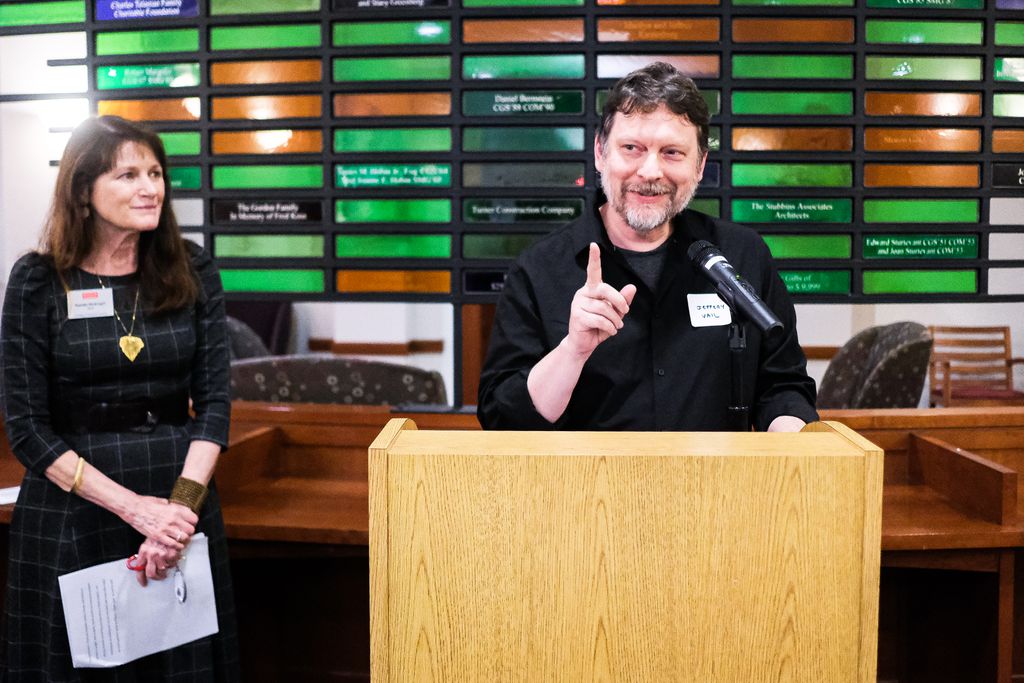
The students from Team U’s winning group–Christian Ahn, Sophia Doiron, Vivian Jiang, Josephine Kim, Jimin Park, Rachell Paz, Jisu Yi, and Chenyu Zhu—extensively researched the mental health problems and solutions specific to the Boston University community. The team created a survey for BU students that offered insight into the strengths and weaknesses of the university's Student Health Services and helped in constructing possible suggestions to improving the department. The group created 'MindMatch,' an online platform dedicated to connecting people to therapists based on their unique needs. Additionally, the team produced 17 appendices of charts, graphs, and other written and visual information to support their ideas.
Team V: Advancing a Policy to Ensure Peace and Security Across the Taiwan Strait

The winning Capstone group for Team V–Aaron Ahmed, Tommaso Arona, Mihir Bhuptani, Akhil Saranath, Victoria Sonn, and Julia Staianof Borri–were driven by the question: How can the US preserve the de facto independence of Taiwan while managing US relations with the People’s Republic of China? After hours of research and compiling an incredibly well-written Capstone project, the group offered a policy that "ensured peace and security across the Taiwan Strait" by avoiding both war and appeasement, largely due to the deterrence of China invading Taiwan. A variety of historical points were used to craft their final resolution, including current US policy on China, the importance of Taiwan to China, the necessity of maintaining US credibility, and other nation's viewpoints on on Chinese expansionism. Faculty said that in their oral defense, each group member confidently demonstrated their knowledge and passion for the project and impressed the professors with their ability to answer all questions in detail.
Team W: The Greening of Nevada: Vertical Farming and Veggie Trucks in a Las Vegas Food Desert

Team W’s winning Capstone group—Jacqueline Jeffries, Ethan Liu, Tina Phan, Nate Pike, Tammy Tie, Alex Ye, Wendy Zhang—researched the widespread problem of inaccessible and unaffordable nutritious food in impoverished urban communities. The group decided to focus specifically on Las Vegas as it presented a special case: food deserts in a literal desert. Their Capstone found that one of the most effective ways of making healthy food, specifically fruits and vegetables, more accessible to impoverished communities is growing food locally. However, Las Vegas lacks the proper farming land needed to achieve this, or so it seemed. Eventually, the group stumbled upon their action plan: build hydroponic farms in neighborhoods most impacted by food insecurity. Hydroponic farms do not require pesticides and use much less land and water than traditional farms, making them a feasible solution for communities in Las Vegas. Additionally, the group came up with various ways to fund their project, obtaining trucks to transport vegetables within the food deserts, and ensuring that food would remain affordable. Faculty said that the group's decision to choose a unique location like Las Vegas made their project, research, and solutions impressive and made their Capstone successful.
Team Y: Partisan Gerrymandering and the Threat to Democratic Representation — An Analysis of the Constitutionality of Partisan Gerrymandering

The winning Capstone group from Team Y, made up of Jules Germek, Emilia Giovannini-Yarnell, Eva Luz Torres Henry, Joseph Levins, Fiona Mellin, and Alexa Podalsky, constructed a fictional legal case to argue before the United States Supreme Court. Their case was against North Carolina's legislature redistricting in 2020, which advantaged the Republican Party. The team presented arguments from both sides of the case. To prepare, the team provided an in-depth analysis of the history of gerrymandering and all the significant legal precedents. Their conclusion involved ending the practice of gerrymandering entirely and passing pending legislation in both states and Congress to circumvent the Court. During their oral defense, the team divided into two to represent each side of the case. North Carolina's case was presented in a staid, legalistic manner while the opponents of gerrymandering presented with a degree of indignation and called out the Court for its questionable distinction between impermissible racial gerrymandering while allowing the corrosive political variety.
—Compiled by Gabrielle Drillis, Photos by Photo by Ziyu Julian Zhu
Student graduates with Minor in Interdisciplinary Studies
By Chelsea Feinstein

Dylan Chow (’21, CAS’23) became the third student to graduate with the College of General Studies’ Minor in Interdisciplinary Studies this spring.
The minor, introduced in spring 2021, focuses on the intersection of the humanities, natural sciences, and social sciences, and the way that thinking across these disciplines can help to solve real-world problems. Students are required to complete two 200-level CGS courses, two interdisciplinary electives, an interdisciplinary directed study, and a Cross-College Challenge course, a project-based elective taught by two instructors from different disciplines. They also must participate in Capstone, a group research project.
Chow’s directed study project focused on the history of Asian American food in greater Boston, culminating in a paper entitled “An Immigrant's Cuisine: Second Generation Chinese Americans' Cultural Relationship Through Food (1970s to the present day)". He worked with Social Sciences Lecturer Kathryn Lamontagne to complete the project.
“I would recommend the minor because it is an excellent way to make strong connections with your favorite professors and provides you with strong communication and leadership skills,” Chow said.
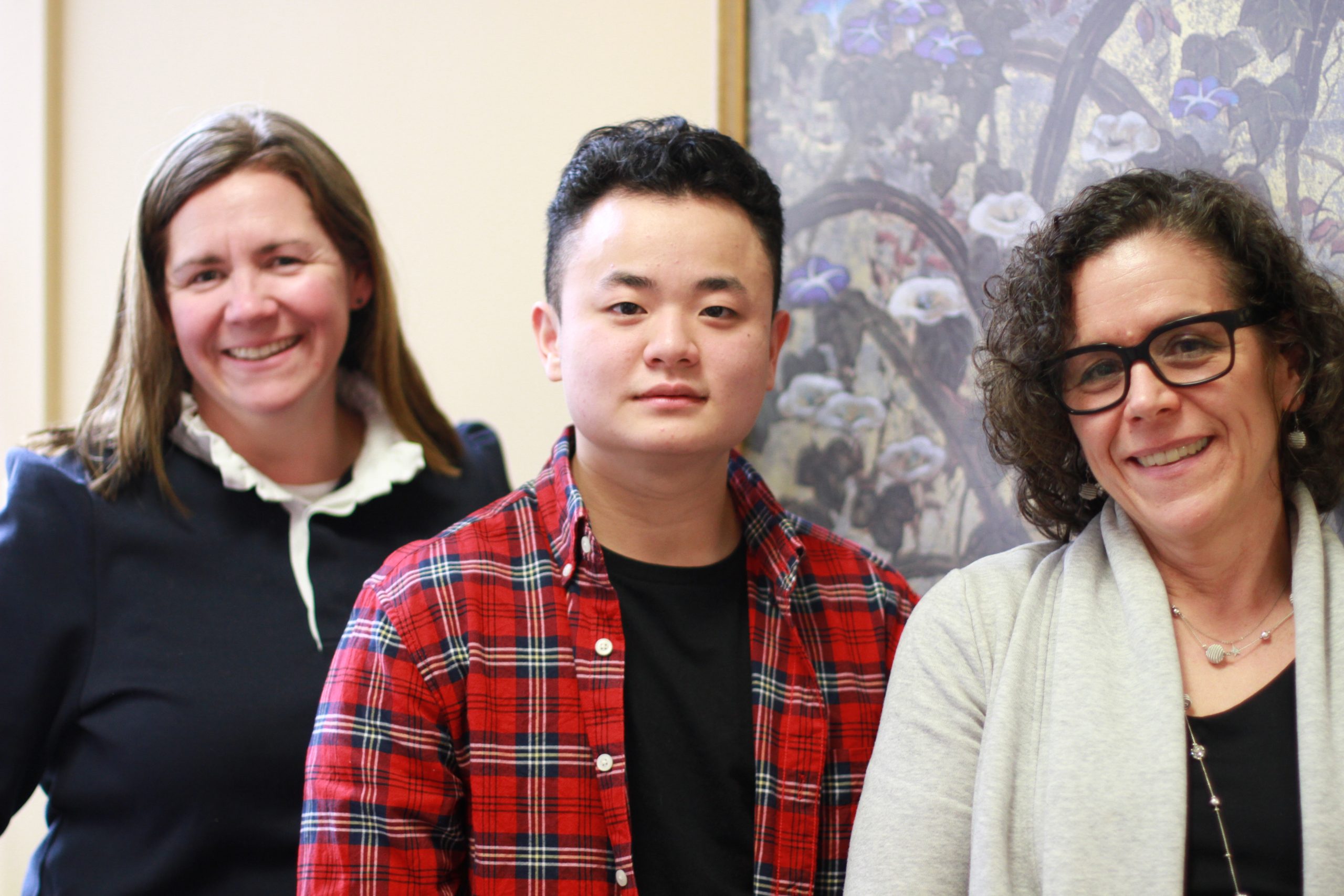
CGS Associate Dean for Faculty Research and Development Lynn O’Brien Hallstein said that Chow’s project allowed him to apply a creative approach to understanding a topic of interest to him, the interconnections between food history and Asian cuisine and the actual making of Asian cuisine.
“In addition to weekly readings, reading reflections and weekly discussion with his faculty mentor, and an end-of-the-semester research paper, Dylan also answered his research questions by dining out at restaurants and attempting authentic recipes at home, which also served as the field work or experimental aspect of the directed study,” O’Brien Hallstein said. “In this way, Dylan’s work was emblematic of the goals of the minor because he applied a creative approach to his study of the food history of Asian cuisine while also engaging in a rigorous interdisciplinary scholarly research.”
O’Brien Hallstein encouraged all students to consider the minor because of how it prepares students for the real world by developing their problem solving skills across disciplines.
“Because the minor encourages students to build the broad base of interdisciplinary learning they need to solve problems, think critically and creatively, take on complex intellectual and practical challenges, and cultivate habits of mind that will help them succeed in any career, the minor can help prepare students to develop the skills and knowledge they will need to grapple with the complex issues they will face in our interconnected world and professions,” she said.
Senior Spotlight 2023
To celebrate the Class of 2023, we asked graduates who attended CGS to share their memories, proudest accomplishments, and plans for the future. Congratulations Class of 2023!
 Iris Fitzsimmons Christensen, CGS and CAS, Spanish and International Relations Major
Iris Fitzsimmons Christensen, CGS and CAS, Spanish and International Relations Major
What student organizations have you been involved in?
Delta Phi Epsilon, Migration Tales, UROP, Global House
What have you done in your time at BU that you're most proud of?
I am most proud of my essay I published in Spanish about the oldest medieval Spanish epic.
What do you have planned for the future?
I am going to get my Master's degree in Hispanic Literature.
What is your favorite memory of CGS?
I am so grateful to all the professors and friends I met through CGS. I would not have had the same experience without them and I was so lucky to have them in my life.
 Jude Hoag, CGS, CAS, and Pardee, Political Science and International Relations Major
Jude Hoag, CGS, CAS, and Pardee, Political Science and International Relations Major
What student organizations have you been involved in?
BU Debate Society, BU Democrats, Q, International Relations Review, First Gen Honor Society, Pi Sigma Alpha
What have you done in your time at BU that you're most proud of?
Running APDA debate nationals with no prior experience.
What do you have planned for the future?
I will be attending Harvard Law School focusing on, hopefully, administrative/regulatory law.
What is your favorite memory of CGS?
Our London trip—after the pandemic stole most of our college journey—was deeply important and impactful to me. In retrospect, I'm grateful to Dean McKnight for her dedication to making that happen. My other favorite part of CGS has been the philosophy we went over in our courses. It has been the subject that has stuck with me the most out of CGS.
 Fiona Kean, CGS and SHA, Communications Major with Concentration in Real Estate
Fiona Kean, CGS and SHA, Communications Major with Concentration in Real Estate
What have you done in your time at BU that you're most proud of?
I’m most proud of following my dreams and getting a concentration in real estate.
What do you have planned for the future?
I’m starting a real estate career for Douglas Elliman in South Florida.
What is your favorite memory of CGS?
My favorite memory is being on a Zoom call with Dean Godnick during the pandemic - we were just simply talking about life. She’s the best!
 Millie Zhu, CGS and COM, Advertising and Film & TV Major
Millie Zhu, CGS and COM, Advertising and Film & TV Major
What student organizations have you been involved in?
BU Global China Connection (Marketing Director)
What have you done in your time at BU that you're most proud of?
Being the marketing director at BUGCC, and also the marketing assistant at BU ECE, where I designed a lot of posters that are in the Photonics building.
What do you have planned for the future?
Going to grad school at USC Annenberg
What is your favorite memory of CGS?
My favorite memory of CGS was being in Professor Lynch's class. His passion and dedication still gives me motivation in social justice and making the world a better place.
 Mariana Villegas Suez, CGS and CAS, Sociology Major, Political Science Minor
Mariana Villegas Suez, CGS and CAS, Sociology Major, Political Science Minor
What student organizations have you been involved in?
Alianza Latina and BU Class Gift
What have you done in your time at BU that you're most proud of?
Honestly, the accomplishment of making it through the “interesting times” of the pandemic and finding community BUT also learning some craft skills and selling my jewelry online :)
What do you have planned for the future?
Taking a break from school to teach, and then going back to grad school!
What is your favorite memory of CGS?
The pandemic made things really difficult, especially after taking a gap semester. I felt so lonely and had a period where I really struggled, and I am so thankful for the wonderful professors that worked with me and were worried about me. We didn’t have the ideal CGS experience but we survived and I’m glad I met the people I did! ❤️
Dylan Chow, CGS and CAS, Psychology Major and Interdisciplinary Studies Minor
What have you done in your time at BU that you're most proud of?
Directed study with Professor Lamontagne
What do you have planned for the future?
I'm currently applying to business school!
 Luis Rosales, CGS and SAR, Health Science Major
Luis Rosales, CGS and SAR, Health Science Major
What student organizations have you been involved in?
Students for Reproductive Freedom
What have you done in your time at BU that you're most proud of?
Working with SRF to establish the contraceptive vending machine in the GSU
What do you have planned for the future?
Law school
What is your favorite memory of CGS?
Being in CGS, I met so many people that I still have a very strong relationship with. Additionally, Professor Byttebier, Lynch and Pederson have greatly impacted me and to this day I still use all the lessons they taught me from their classes.
 Abigail Lowry, CGS and COM, Public Relations Major, Innovation & Entrepreneurship Minor
Abigail Lowry, CGS and COM, Public Relations Major, Innovation & Entrepreneurship Minor
What student organizations have you been involved in?
Build Lab, Study Abroad, Student Government and a few clubs here and there
What have you done in your time at BU that you're most proud of?
I am most proud of my directed study on ESG trends with Fortune 100 companies.
What do you have planned for the future?
Continue looking for jobs after returning home for the summer
What is your favorite memory of CGS?
I have been so lucky to have taken classes in CGS and gotten to meet such amazing humans and be a part of our wonderful little community, and I will miss everyone in it.
 Paul Ovadek, CGS and Pardee, International Relations Major
Paul Ovadek, CGS and Pardee, International Relations Major
What student organizations have you been involved in?
Dean's Host @ CGS; Dean's Ambassador @ Pardee; Student Facilitator for Orientation; Peer Mentor for FY 101; Barista @ GSU Starbucks
What have you done in your time at BU that you're most proud of?
I'm really proud of the role that I played in establishing events designed to help CGS students transition into academic life at Pardee. I look forward to seeing these events grow further, to best prepare CGS students to continue into Pardee, in the coming years!
What do you have planned for the future?
I currently don't have any plans set in stone, but I'm looking forward to using my academic and interpersonal experiences to help others throughout the world and to better my communities!
What is your favorite memory of CGS?
My favorite memories from my time in CGS include the reception for winning my group's Capstone project—as it was nice to celebrate our achievement with my family, friends, professors, and the CGS community, even if via Zoom—and the one-week trip to London that I took with my friends and professors. It was great to see so many familiar faces again!
2022 Capstone Award Winners
On October 21, the Boston University College of General Studies celebrated the outstanding students who received awards for the Capstone projects they completed last May. The Capstone project is a 50-page research paper that CGS students complete in their sophomore year. Students draw on two years of interdisciplinary studies, working together as a team to synthesize data into a meaningful whole. The Capstone award is given annually to the group of students who present the best overall Capstone paper and defense on each team. It is the highest honor bestowed upon a College of General Studies student for an academic project.
Team S: Social Media Privacy Protection Association: A Proposal for Data Privacy

Team S’s winning Capstone group–Zelin Liang, Anqi Lu, Peizi Wang, Zeya Wu, Jiarong Ying, and Yunqi Zhu–created The Social Media Privacy Protection Association, a nonprofit organization that aims to protect and raise social media users’ awareness of the right to data privacy in the United States. Their Proposal for Data Privacy calls for a more concrete and transparent Personal Privacy Rating system regarding the sensitivity of personal information. They also designed the Personal Information Rating System, a personal information hierarchy authorization system that users select and authorize. Faculty said, "Rather than seeking new legislation, their proposal seeks cooperation with and support from existing social media companies to seek a fine balance between consumer privacy and corporate profitability, as well as forging ties with the Federal Trade Commission and garnering community-level support."
Team T: Maternal Mortality in New Jersey: A Midwife-Centric Solution

Team T’s winning Capstone group was made up of Caroline Cain, Kyle Cioffi, Isabel Duverge, Olivia Madajczyk, Katie McHugh, Sarah Reeves, and Emma Shapiro, who engaged in a sound research project that highlighted the need to improve access to midwifery care in New Jersey. Solutions included incentives for midwives to work in communities where there is a shortage of healthcare providers and the development of educational programs to offer alternate and humane maternity care models. Team T faculty said that the Capstone was thoughtfully plotted and sophisticated in its understanding of the problem and detailed in its proposal of a solution. They wrote, "The thesis illustrated how midwives’ personalized care would address factors contributing to the high maternal mortality rate such as the overmedicalization of birth, lack of access to evidence-based care, and improper treatment of postpartum depression. Lucidly-written, well-argued, this Capstone provides a model for other states to replicate."
Team U: Exploring Solutions for Boston’s Rising Sea Levels

The students from Team U’s winning group–Margaux Calvignac, Emma Hill, Amelia Love, Margaux Mooney, Zachary Myers, Fernando Ramirez, Aiden Schimpff, and Dylon Thompson—investigated and assessed various proposed approaches to Boston’s rising sea level problem, before presenting their own plan, which combines manufactured and natural solutions. The group paid particular attention to the neighborhoods of Dorchester, South Boston and East Boston, making specific recommendations for each area. Deployable flood barriers and walls, permeable pavements, green solutions, enhancements to the MBTA system and changes to the city’s annual budget are all elements of the group’s comprehensive, well-researched and clearly written proposal, Team U faculty said.
Team V: On the Non-Consensual Usage of Private Consumer Data

The winning Capstone group for Team V–Myles Bahar, Olivia Clyne, Azad Ellafi, Hailey Gustafson-Alm, Elizabeth Kostina, Shiksha Nanda, and McQuaid Shin–tackled what faculty called "arguably the most challenging problem on our Capstone syllabus: data privacy." They examined the ethical, technical, and legal problems that arise as individuals give up more and more of their sensitive personal information—both willingly and unwillingly—to private corporations. Team V faculty said, "This group of students engaged these thorny problems with nuance, complexity, and a full knowledge of the difficulties they faced. They decided to take what was essentially a philosophical approach to the problem, entering into a lengthy discussion of consent in the digital age...Few of us are willing to take our lives offline to avoid the privacy concerns caused by massive data harvesting, but in their Capstone, this group of students offered us some ways to navigate online spaces with our eyes open just a little bit wider."
Team W: Resisting Widespread Antibiotic Resistance (RAWR)

Team W’s winning Capstone group–Nathan Chen, Gary Dong, Victoria Hwang, Minji Kim, Angela Miao, Eloise Ren, Sikha Sahu, and Kitty Xia–addressed the fact that bacterial resistance to antibiotics is becoming a major public health issue, with approximately 35,000 deaths from antibiotic resistant infections every year in the United States alone. Faculty said that this group not only succeeded in gaining and explaining this disparate knowledge, but also built a sophisticated and realistic policy, proposing a public-private partnership to bring new antibiotics to market. Team W faculty said, "Ultimately, this group excelled at research, wrote their Capstone in one clear voice, and formulated a policy that actually seems like it would work to address this significant problem."
Team Y: US-China Trade Relations

The winning Capstone group from Team Y, made up of Surui Chaui, Zechang Jiang, Xinyi Li, Haoyu Liu, Zhenhuan Wang, Sand Zhou, and Zirui Zhou, examined the trade imbalance between the US and the People’s Republic of China. To explore this topic, they adopted a hybrid format that combined the policy paper approach with the adversarial approach. Team Y faculty wrote, "Their briefs from the two nations and findings from the WTO showed a deep understanding of the issues involved and proposed innovative yet realistic solutions. Most impressively, in their defense, the entire group demonstrated a thorough knowledge of their subject matter and regularly showed an ability to go beyond the basics of their written work. The energy and dedication they put into the project process resulted in a work that is an example of what groups can achieve via Capstone. Their win this year is a well-deserved testament to a well-designed, well-executed, and well-defended project that asks important questions about our world and seeks to answer them."
—Compiled by Rukshana Khan
CGS Celebrates 70th Anniversary

For 70 years, the College of General Studies has been a home to students within Boston University, instilling the value of exemplary interdisciplinary education, providing the backdrop for lifelong friendships to be built, and preparing its students for the challenges of real world problem solving.
On Sept. 29, CGS alumni, students, faculty and staff gathered in the Katzenberg Center to celebrate the College’s 70th birthday, recognizing the accomplishments of the last seven decades while looking forward to the future.
The celebration, held as part of BU’s Alumni Weekend, also featured the presentation of three annual faculty awards as well as the Distinguished Alumni Award to attorney Mitchell Garabedian ('71, CAS'73).

70 Years of Excellence
In her remarks commemorating the anniversary, Dean Natalie McKnight reflected on how much about the College has stayed the same over the years, while also highlighting several key changes.
“We still offer an interdisciplinary core curriculum, the team structure is still in place, and we still end the sophomore year with a group project, which used to be the Utopia project and is now the Capstone project,” McKnight said. “Perhaps most important, we still believe in the transformative power of a liberal arts education that emphasizes strong connections among students, faculty and advisors.”

But while the College’s foundations remain unchanged, several new developments have been made in recent years, McKnight said, including the addition of the fall gap semester and summer study programs in London and New England for first-year students, the launch of the Minor in Interdisciplinary Studies, and the increased focus on research among undergraduates and faculty.
“I am very proud to be part of such a vibrant college that has grown in such unique, creative and impactful ways while also still preserving the best bones of our initial architecture,” McKnight said.
McKnight also announced the creation of the CGS Anniversary Scholarship Fund, which will become endowed once $100,000 is raised. The fund will provide scholarships to support the education of CGS students in need.
Honoring a Distinguished Alumnus
CGS's Distinguished Alumni Award was presented to Attorney Mitchell Garabedian, whose work representing and advocating for victims and survivors of sexual abuse was immortalized in the Academy Award-winning film Spotlight.
Garabedian has represented more than 2,500 victims of sexual abuse in 14 countries, won substantial settlements for those victims, and successfully argued that clergy should be added to the list of mandatory reporters of child abuse and that statues of limitations have not expired in cases brought by adults who were sexually abused as children.

McKnight praised Garabedian for his bravery in taking on the Catholic Church in Boston and for the difference he has made not just in the lives of his clients, but for the many other abuse survivors who have since come forward to tell their stories.
“Mr. Garabedian, you have made the world a better place for thousands of clients,” McKnight said. “You have helped them achieve some measure of justice, and compensation for their suffering, and your work has encouraged others to come forward and made it easier for them to present their cases. You have helped give voice to the voiceless and you continue to pursue this mission.”
In his acceptance speech, Garabedian thanked CGS for the education he received as a first-generation college student. He commended the faculty for always having the door open to students, literally and figuratively, and said he is still grateful to the school for the ways in which it shaped him as a young person.
“The door was always open. And they always interacted with you, they always encouraged you, they always pushed you,” Garabedian said of his professors.
Recognizing Extraordinary Faculty
McKnight also presented three awards to outstanding members of the CGS faculty.

The Peyton Richter Award, established by alumnus Gary Kraut and awarded annually to faculty who have demonstrated excellence in interdisciplinary teaching, was presented to Associate Professor of Rhetoric Aaron Worth.
Worth’s ability to balance his teaching duties with his prolific research and publishing record made him a deserving candidate for the award, McKnight said.
“Students praise Aaron for his enthusiasm, intelligence, and ability to make connections among disparate topics. Many thank him for the ‘valuable lessons’ he has taught them both within and beyond the classroom,” she said.
The Dr. Ismail Sensel Award, given to CGS professors who have demonstrated excellence in their professional record, was presented to Christopher Coffman, Master Lecturer in Humanities.
Coffman’s work as Book Review Editor for the last 11 years on Impact: The Journal of the Center for Interdisciplianry Teaching & Learning and his publications on topics ranging from Thomas Pynchon to the Grateful Dead were highlighted.
“On top of these professional achievements, Chris is also an outstanding teacher of Humanities in our Boston-London program and very capably led his team in London this summer in our return to the city,” McKnight said.
The Outstanding Service Award, which rewards faculty whose leadership and service has made substantial contributions to the CGS community at large, was presented to Meg Tyler, Associate Professor of Humanities.
Tyler was recognized for her work as Director of CGS’s Institute for the Study of Irish Culture for over 10 years, through which she has led a series of readings and lectures on contemporary poetry and literary studies.
“I am grateful to Meg for her leadership in running the series and building a sense of community centered in CGS, and also grateful for her leadership as coordinator for her team of faculty at CGS. She brings to the leadership of her team the same attention to detail and dedication to community building that make her events so successful,” McKnight said.
Watch a slide show of archive photos from CGS's 70-year history below:
-- By Chelsea Feinstein
A Look at Undergraduate Research: Women Writers in the Late Victorian Era
By Ella Nasca

Before coming to campus for the first time in the fall of 2021, Fangqi (Doris) Luo ('22, CAS'24) excitedly looked through the CGS website to get a sense of what in-person studies would be like.
Luo stumbled upon a section about the Center for Interdisciplinary Teaching & Learning (CITL) and quickly became interested in the research opportunities the Center offers. CITL provides students with the opportunity to perform paid undergraduate research alongside the guidance of CGS professors.
“It surprised me because the center is open to freshman and sophomore students,” said Luo. “It’s hard to imagine that a sophomore student could have the opportunity to do undergraduate research.”
Luo was a student of Master Lecturer of Humanities Joellen Masters, and noticed that Masters had teaching interests in Victorian and British literature and research interests in Victorian and New Woman Fiction listed on her faculty profile. Though Luo did not yet know what she wanted to major in, she saw that they had a shared interest in women’s studies, and decided to reach out to discuss her academic plans and ask to work on research together.

“Dr. Masters inspires me to be a more engaged person,” said Luo, who is now planning to continue into the College of Arts & Sciences and major in statistics. “She always guides me to think about my questions from different perspectives.”
After a discussion during office hours, the two decided to work together.
For several years, Masters had been researching for her monograph study about a British periodical called Travel: An Illustrated Monthly Magazine, which first appeared in May 1896 and ran for eight volumes. The magazine, edited by Sir Henry Lunn, frequently featured short stories written by women writers.
When the pandemic struck, Masters had to put a halt on much of her research, as she didn’t have access to the physical materials she needed to study. She was able to resume this research with Luo.
The two decided to continue studying the short stories in Lunn’s magazine as well as seven British women writers—who also featured in Lunn’s periodical—and seven other periodicals. The writers include Adeline Sergeant, A.M. Williamson, E.F. O’Brien, Iza Duffus Hardy, L.T. Meade, Marie Corelli, and Mary Angela Dickens.
While some writers, like A.M. Williamson and E.F. O’Brien, have little information available about them, others like L.T. Meade and Marie Corelli were very well known for their work. Mary Angela Dickens was even one of Charles Dickens’s granddaughters.
The periodicals they studied included All the Year Round, Atalanta, Belgravia, Cassell’s Magazine, The Lady’s Realm, The Strand Magazine, and Tinsley Magazine.

Masters and Luo were both interested in finding out more about the backgrounds of these women writers and the work they were publishing, as well as the rise of the short story genre in the Victorian period and its appearance in periodicals.
“Doris and I were meeting once a week for about an hour,” Masters said. “I really didn’t want to stop the conversation, because it was just so interesting.”
Luo was responsible for gathering research through websites and online databases, and organizing her findings using numerical data and charts. Then, the two would discuss their findings and thoughts about the stories in weekly meetings.
“The study of humanities has moved into using data driven material,” Masters said. “I think that being able to have both the literary analysis and the quantitative visual with our work is going to be super important.”
The two have plans to delve deeper into feminist theory and women’s writing during the fall 2022 semester, as CITL often continues to support students even after they complete their two years CGS.
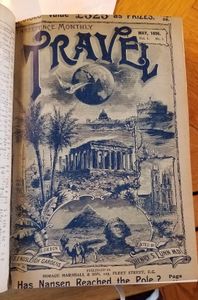
“I am ending this semester with nothing but amazing gratitude for all the work that Doris did and the conversations we had,” Masters said. “It’s important that people see what we’ve been able to do as collaborators, and especially in this academic environment right now where the emphasis is on collaboration between faculty and their students.”
Luo shares similar sentiments about the research she and Masters have completed so far.
“I learned a lot from Dr. Masters,” Luo said. “I am so excited that I have the opportunity to become a more engaged person and reflect on these women writers and outstanding periodicals.”
CITL provides stipends for CGS students to pursue paid undergraduate research with a member of the CGS faculty. Students interested in pursuing undergraduate research can learn more here.